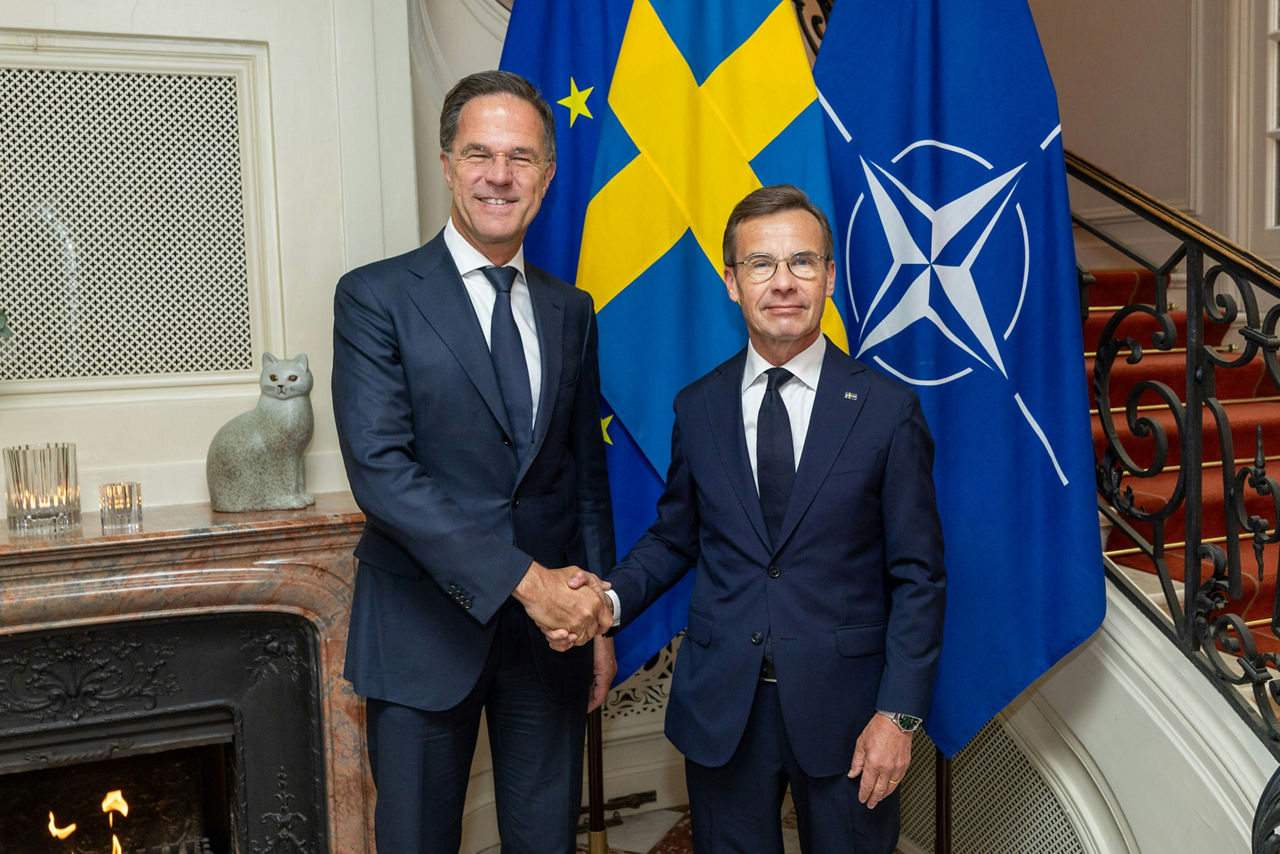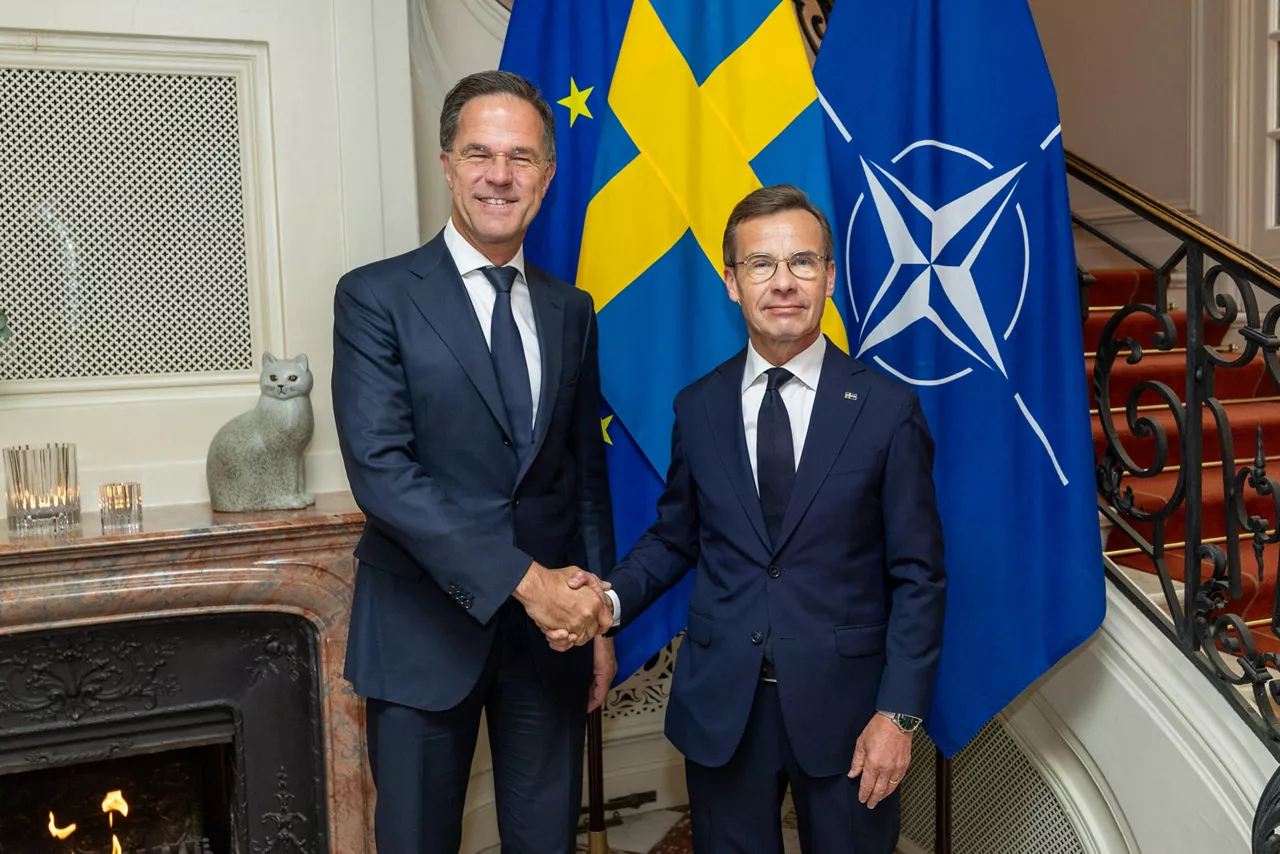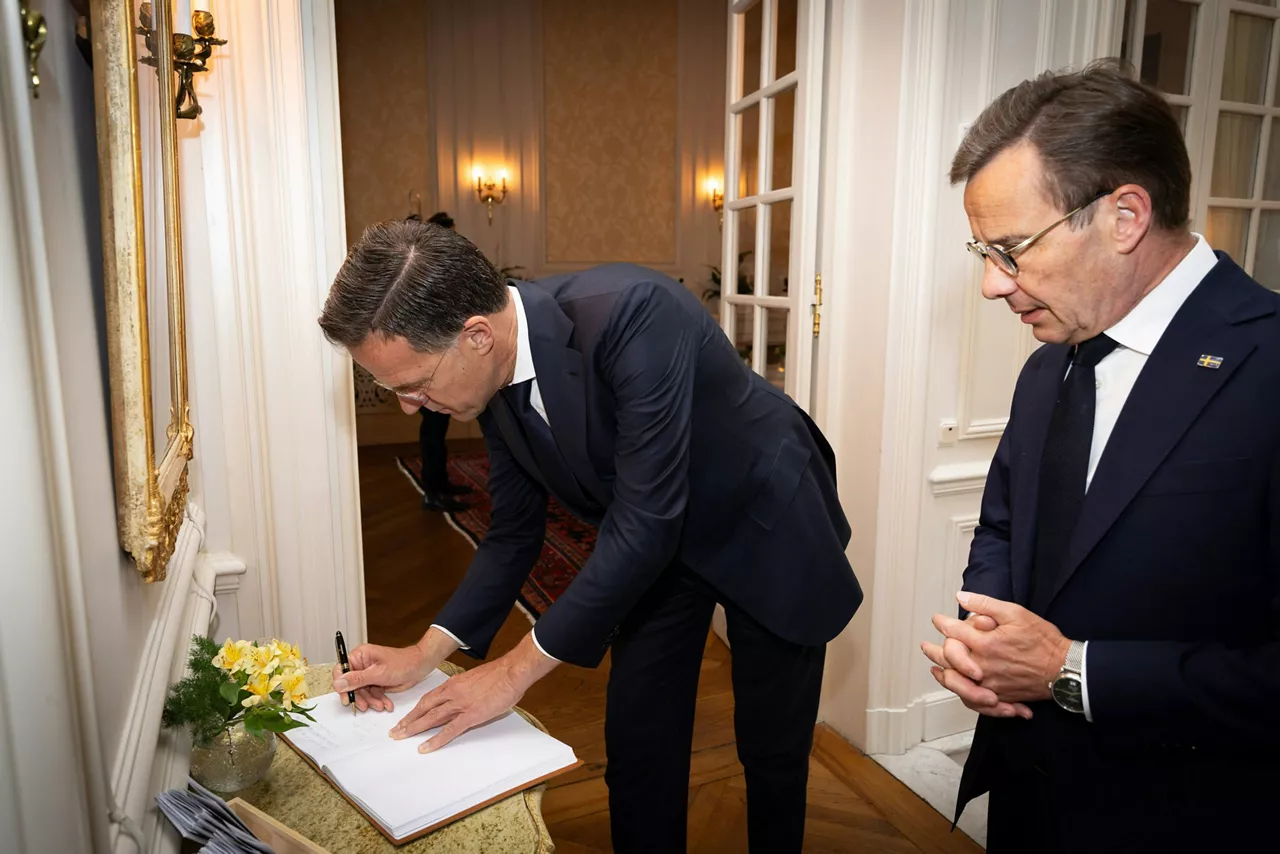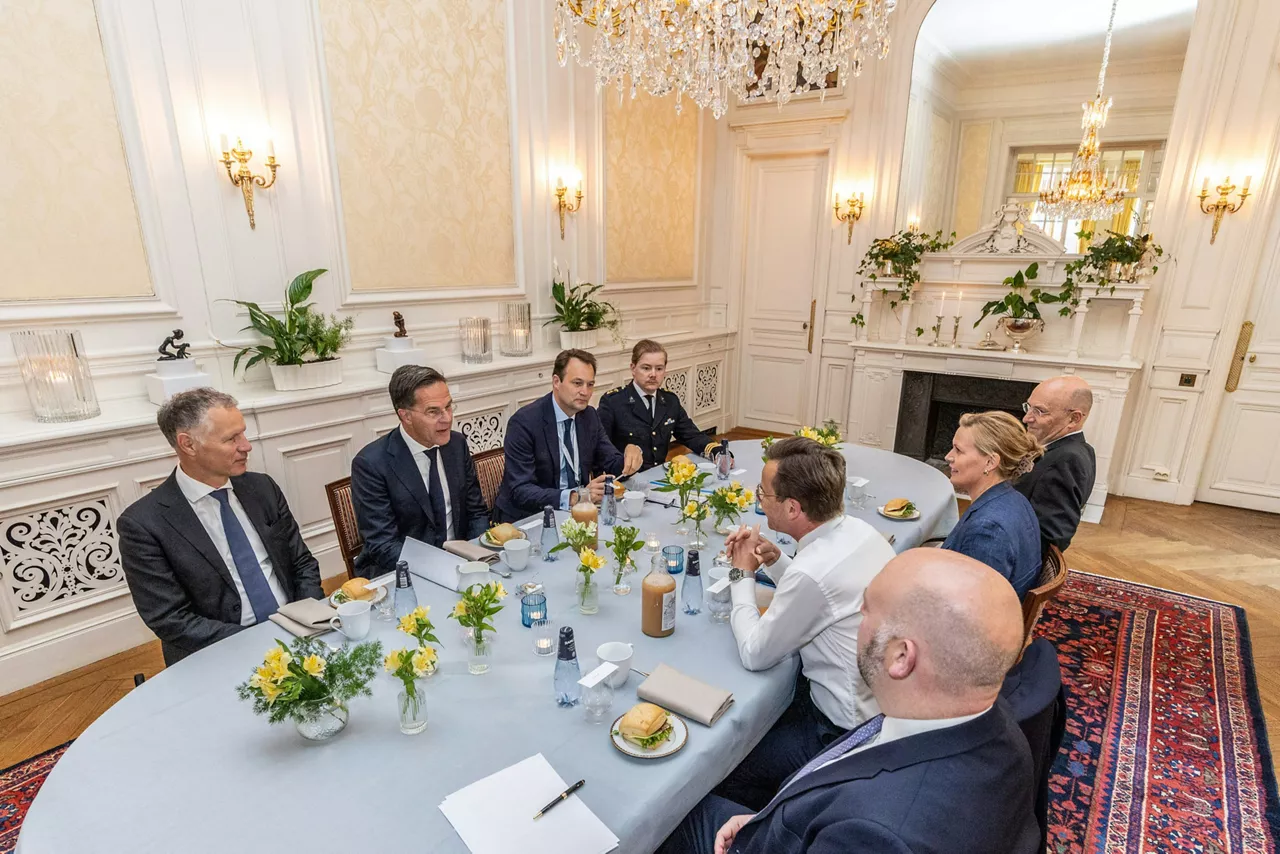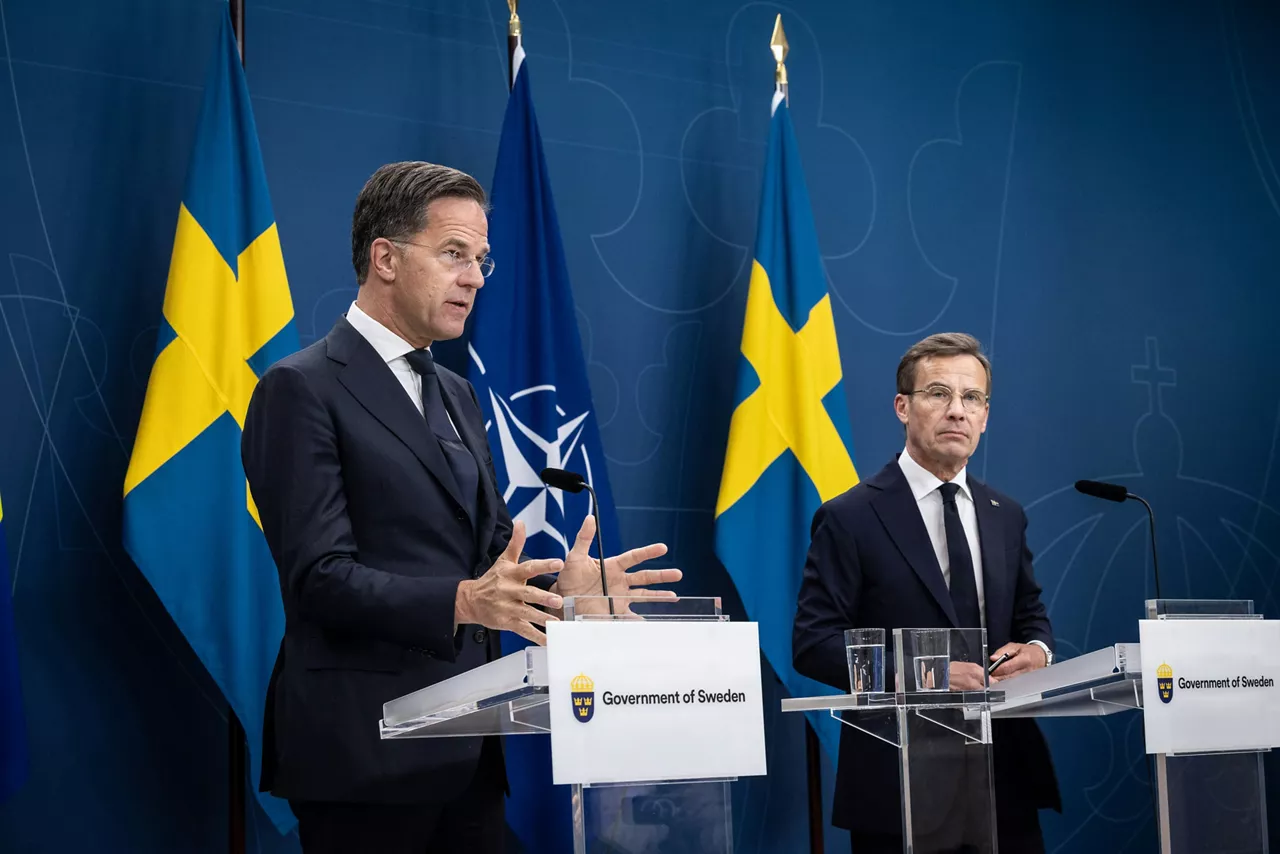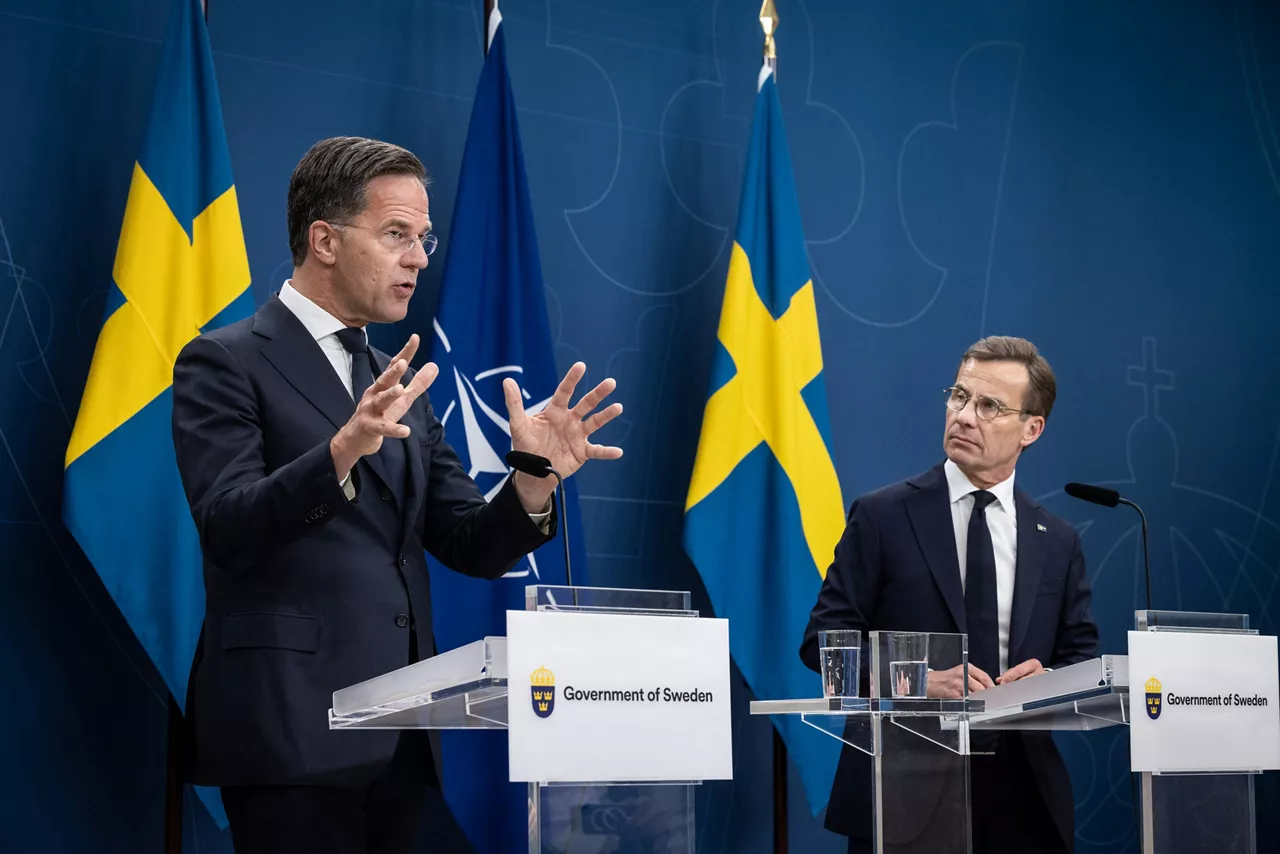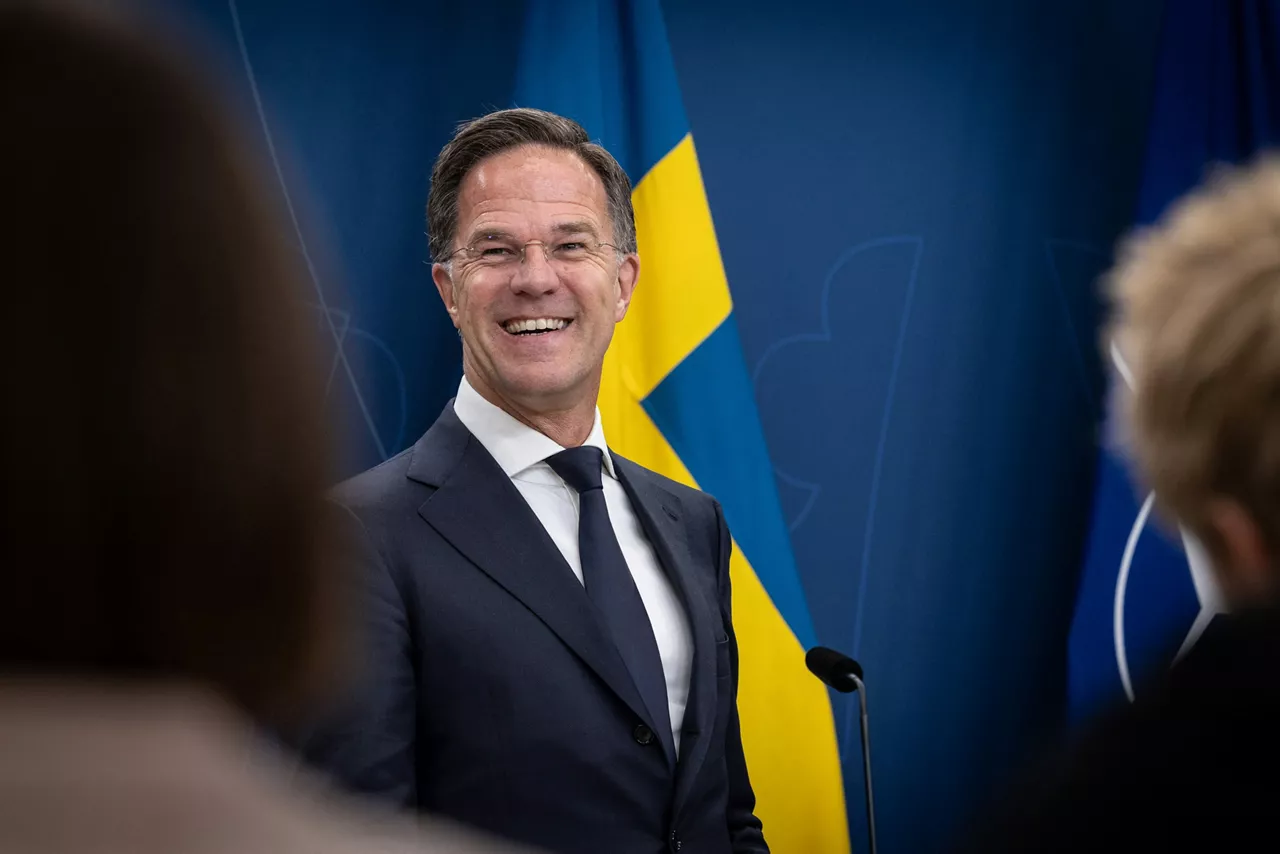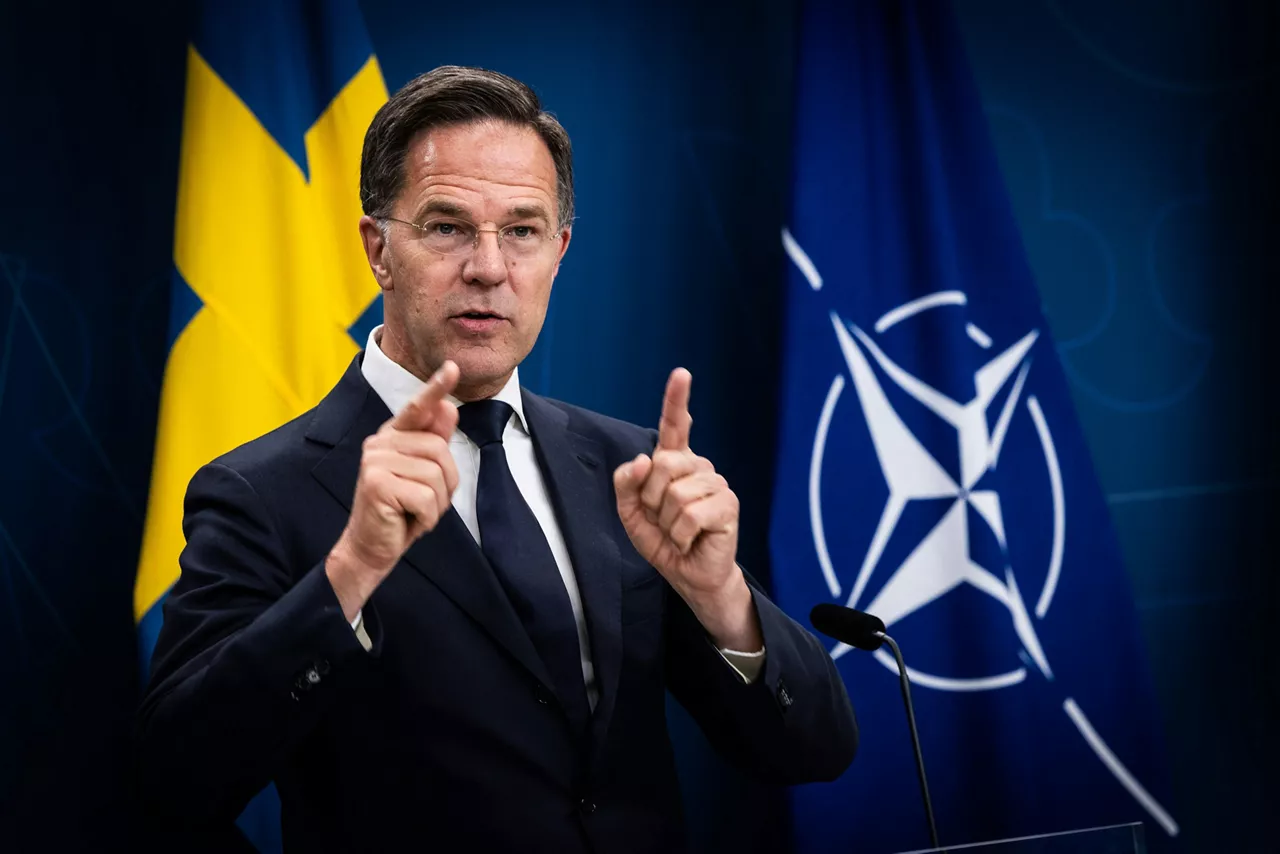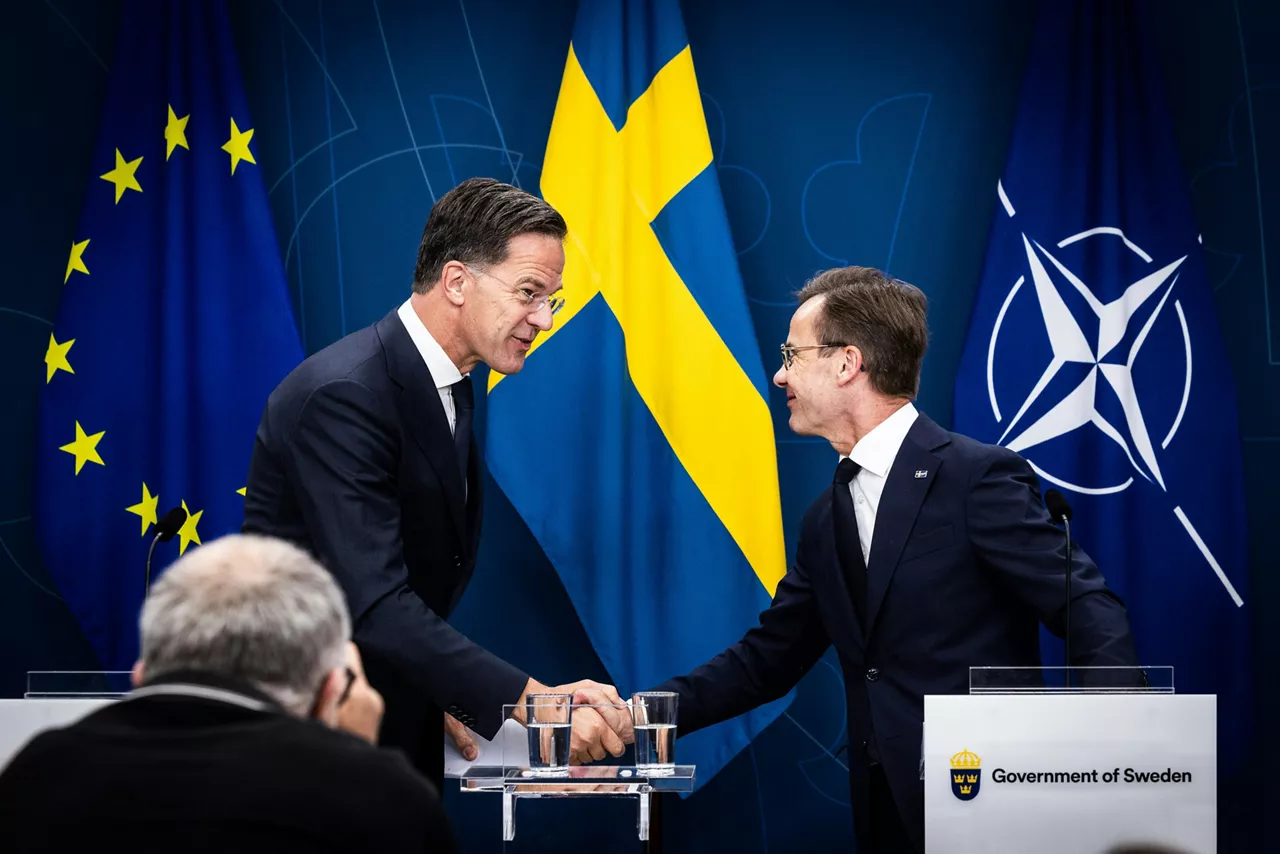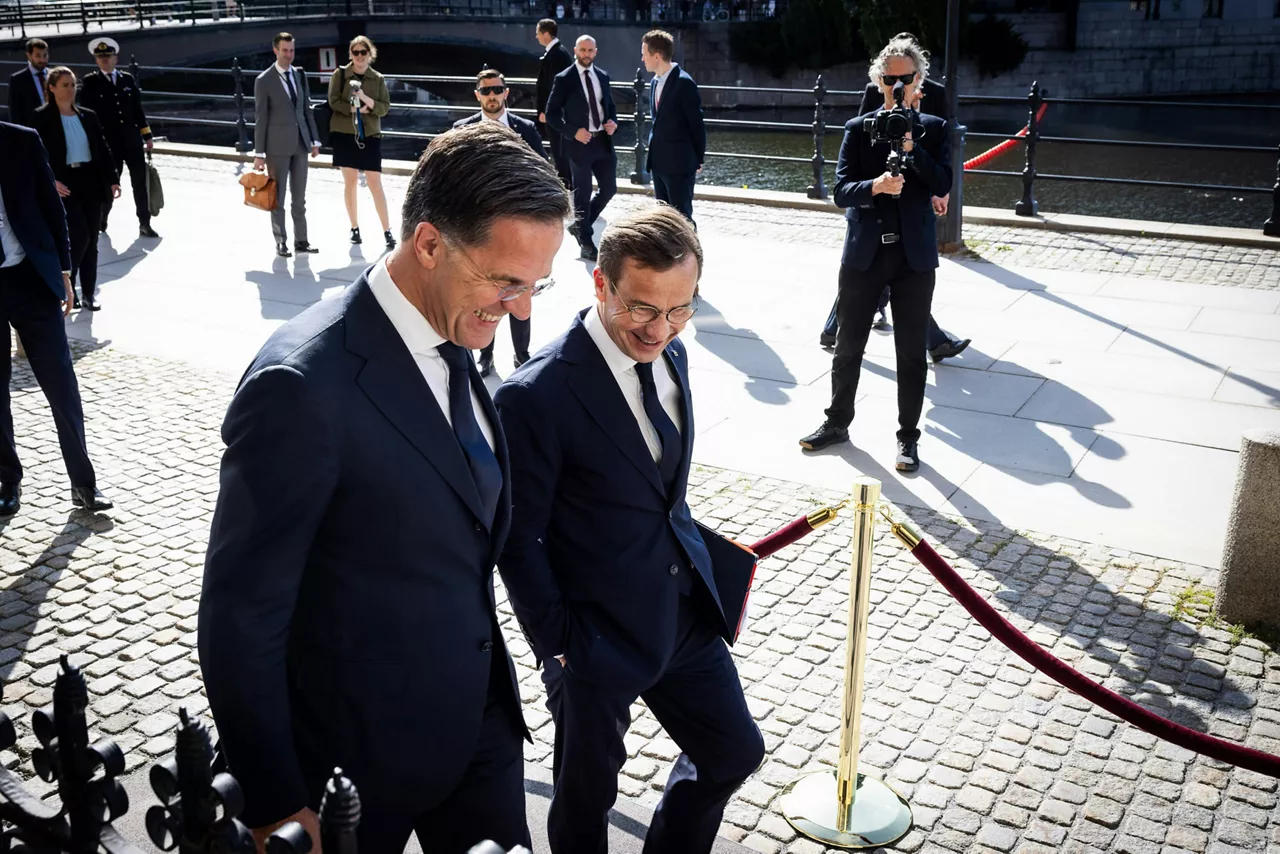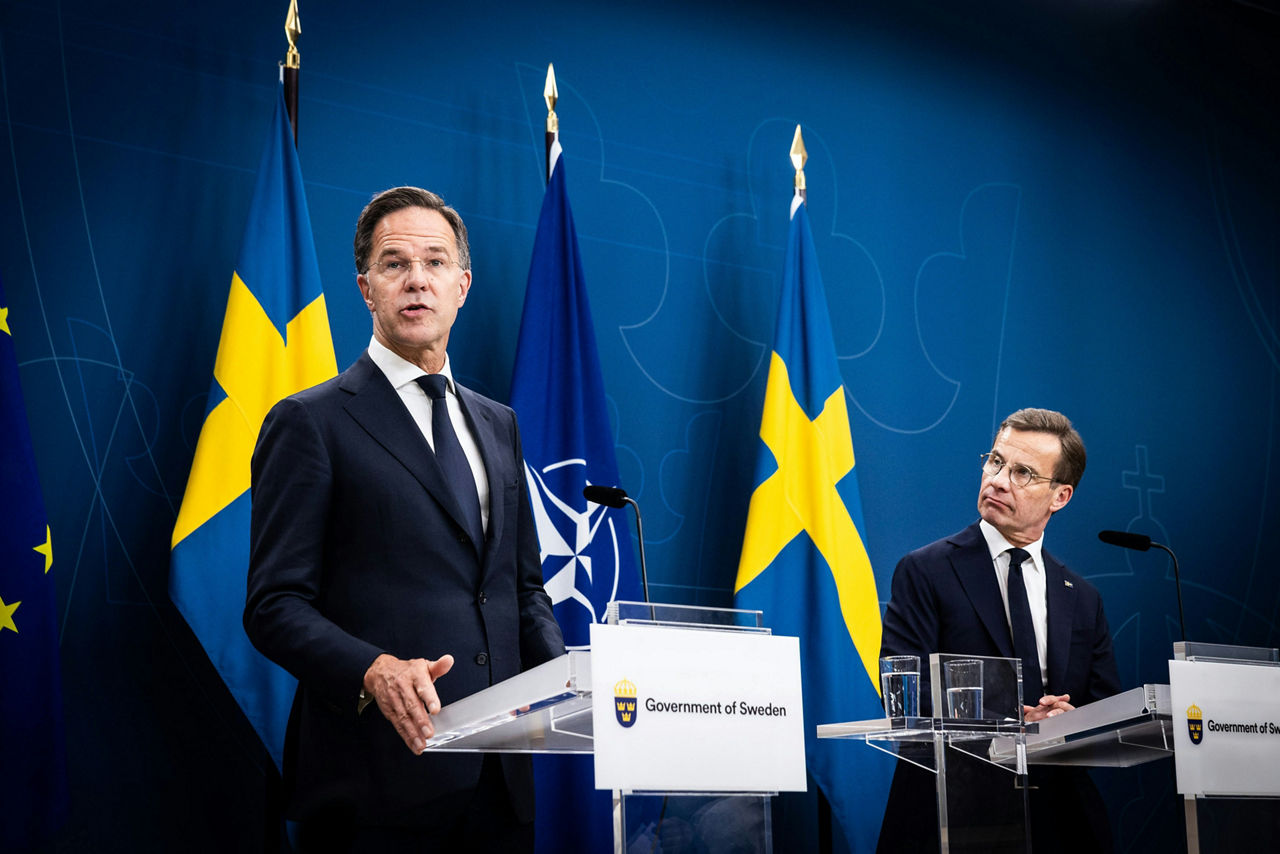Download NATO’s broadcast-quality video content free of charge

Log in
NATO MULTIMEDIA ACCOUNT
Access NATO’s broadcast-quality video content free of charge

Check your inbox and enter verification code
You have successfully created your account
From now on you can download videos from our website
Subscribe to our newsletter
If you would also like to subscribe to the newsletter and receive our latest updates, click on the button below.
Enter the email address you registered with and we will send you a code to reset your password.
Didn't receive a code? Send new Code
The password must be at least 12 characters long, no spaces, include upper/lowercase letters, numbers and symbols.
Your password has been updated
Click the button to return to the page you were on and log in with your new password.
(As delivered)
Prime Minister Kristersson,
Dear Ulf,
Thank you, thank you Ulf, and thank you for welcoming me to Sweden. It is always a pleasure to see you, and to be back in beautiful Stockholm.
And this is my first visit here as NATO Secretary General – and it’s an honour to be here with our newest Ally.
Sweden has only been a member of our Alliance for now 15 months, but you are already making major contributions across the Alliance.
Your forces strengthen our posture in the High North and in the Baltic Region.
As you said, you contribute to Forward Land Forces in Latvia, and you will lead NATO’s newly established Forward Land Forces in Finland.
Indeed, your Gripen fighter jets help patrol the skies over Poland, and your ships contribute to our enhanced military presence in the Baltic Sea through Baltic Sentry.
Sweden is also one of NATO’s seven Arctic Allies – and your expertise in the region has enhanced our posture in the High North and strengthens our ability to reinforce our Baltic Allies.
Last week in Brussels, NATO Defence Ministers agreed on an ambitious new set of capability targets.
These targets describe what capabilities Allies need to invest in over the coming years.
From our air defence and fighter jets, to tanks, drones, logistics and of course personnel.
And this is what it takes to keep our one billion citizens safe – and to keep our deterrence and defence strong, against a rapidly reconstituting Russia.
So these targets, these capability targets, are the foundation for a new defence investment plan – a key priority which we will take forward during the NATO Summit in The Hague.
Last year, Sweden invested already 2.66% of your GDP on defence, and indeed I welcome your government’s strong determination to go much and much further.
This is a clear demonstration of Sweden’s commitment to collective defence.
Boosting defence industrial production is another key priority for the Summit in The Hague – and Sweden also here is playing a leading role.
Because you have a world-class defence sector.
With companies like SAAB, the leading supplier to the Swedish Armed Forces, and Volvo Defence, Sweden is helping to drive forward the modernisation and resilience of our collective NATO defence industry.
Sweden is also a hub of advanced research on defence industrial capabilities.
Sweden is a staunch supporter of Ukraine.
Since 2022, you have provided over 7 billion euros in military assistance to Ukraine – including 1.25 billion in the first four months of this year alone.
In terms of GDP, this places Sweden among the top contributors to Ukraine.
And I also welcome your investment in Ukrainian defence industry.
You are truly leading by example.
We are now less than two weeks away from the NATO Summit in The Hague.
And there, I expect leaders to make bold decisions to further strengthen our deterrence and defence – including agreeing a new defence investment plan that would bring our defence investment to 5% of GDP over the next several years.
This will ensure that Allies have the forces, capabilities, and also the industrial base required to meet the challenges of today and tomorrow.
So dear Ulf,
Thank you once again for your hospitality, your leadership, and your commitment to our transatlantic Alliance.
Ulf Kristersson, Prime Minister of Sweden
Thank you so much, Mark. And please, the floor is open.
Moderator
We will start with a question from TT, over here.
Question, TT News Agency
Thank you very much. I would like to ask the General Secretary and also the Prime Minister, could you elaborate regarding the situation in the Middle East, with Israel and Iran. You say that this could escalate, how? And also, what should the international community do right now in order to de-escalate the tensions?
Mark Rutte, NATO Secretary General
Well, it is obviously a rapidly evolving situation, and this was a unilateral action by Israel. So, I think it is crucial for many Allies, including the United States, to work, as we speak, to de-escalate. I know they are doing that, and I think that is now the first order of the day.
Moderator
Alright, we will do the next question from SVT.
Question, SVT
[Inaudible], SVT, question to you both. First, Mr. Secretary General, Sweden has recently seen a wave of suspected cyber-attacks. What is your view, was this expected when Sweden became a NATO country, and what can NATO do to defend and deter member countries against these kinds of cyber-attacks? And Mr. Prime Minister, could you elaborate in Swedish on the Swedish GPT goal that you told us about?
Mark Rutte, NATO Secretary General
NATO is facing cyber-attacks, but of course, also in some cases, even the jamming of commercial airplanes in the Baltic region. So we see many versions of these hybrid threats, and the cyber-attacks are, of course, a big worry. It's impossible for me to assess whether there is a direct link between these attacks and now Sweden being a member of NATO. Of course, Sweden always had an impressive defence industrial base and an impressive defence system itself. So I guess also in the past, our adversaries would also have an interest in Sweden, even before you joined NATO. But what we have to do collectively, and this is what NATO is getting better and better at, is to make sure, generally, when it comes to these hybrid threats, to make sure that we collectively assess what is happening, that we collectively decide on what is the best way to protect ourselves. Of course, we are not going to make our adversaries any wiser by going into all the details, but you can be assured that we navigate this very closely together, and that Sweden plays a big role there.
Question
I will ask both of you regarding the situation in the Middle East right now, how close is maybe a nuclear war or maybe a world war?
Mark Rutte, NATO Secretary General
No, we are not close, and obviously Allies within NATO are really navigating this crisis. Everybody is focused on de-escalating it. The US, of course, is working on that with other Allies. NATO not being involved as an Alliance, because it is really focusing on the Euro-Atlantic. But obviously NATO Allies very much involved to make sure that the conflict is de-escalated as soon as possible.
Question
Hi Mr. Secretary General, according to the timetable, Sweden talked here about 2030, other countries I hear talk about 2035. What do you think about that?
Mark Rutte, NATO Secretary General
Well, of course, I put forward proposals, but what I made public is the percentage, which is the 5%, 3.5% core defence spending, and then 1.5% focused on defence related and security related spending, including developing the defence industrial base and getting the whole society basically prepared for disasters, including a full onslaught on NATO territory. But I'm not going to disclose my thoughts on the end date, because of course, these are consultations and taking place now between Allies.
Question
So what about this 5% goal? If we focus on the 1.5% which is a new one, could that be investment also that could support the military, like railways, roads? Can it also be the overall resilience of society?
Mark Rutte, NATO Secretary General
Yes. So the idea here is the following. We have always focused as NATO and in all our discussions on the core defence spending. That's the famous 2% coming out of Wales, the Welsh pledge. And two things have happened. First of all, the Welsh pledge was basically this. It was just a figure plucked from the air. The new number, the 3.5 core defence spending, is really rooted now in this whole NATO defence planning process from which we have decided the targets we need to achieve and the gaps therefore we have indicated there are to make sure that we can defend 1 billion people living in NATO territory. So that's new, that we not only have a number, but the number is rooted in facts, figures and deep studies on what NATO needs to defend all of NATO territory.
The second new thing is that, next to that old 2%, the new 3.5%, we also decided we have to focus more on everything defence-related. Indeed, exactly as you said, that has to do with making sure your infrastructure cannot only support your Volvo car, but is also able to support the tank, to make sure the tank can, for example, cross the bridge. It has to do with developing the defence industrial base. Because what is really keeping me awake at night is, yes, of course, the defence spending. But I think we can get there in The Hague, I must say. The longer term reason to stay awake at night is that we are not producing enough to make sure that we can defend ourselves, for example, against the Russians. And they are rapidly reconstituting themselves, including their defence industrial base, having their whole economy now on a war footing. And that means that the 1.5% is also related to this: developing the defence industrial base.
And then third, indeed, is the whole-of-society approach. You here in Sweden, and I met him, you have a minister who's solely responsible for, I don't know exactly what his job title is, but not for the defence part, but to make sure that the whole society is prepared. Sorry for the way I explain it. You know better of course, his exact job title. But I met the guy and I was really impressed. But also countries like Norway, the Baltics, Finland, many other parts, including my own country, we have not something like that. We need to develop much more in terms of getting the whole society prepared. And that is much more than making sure we have water for three days. Yes, that's also part of it, but it has to do with where do you go to if a disaster, natural disaster, or a military disaster strikes your country? Where do you go to? What is the role? Who will do what, etc? So that is much more than only making sure that you have food and water for three days.
Moderator
Okay, Reuters, if there was a question, then SVD.
Question
Yeah, first a question for both of you, and that is, how can the international community work to bring, bring this back to the negotiate negotiation table situation in the Middle East? And can you estimate the chances of that happening? And then I have a question for the Secretary General, and that is, 5% is, is what the US President Donald Trump has been talking about. If you decide on 5% in The Hague, will that satisfy Donald Trump and protect the Transatlantic link, and what will happen if many countries doesn't reach the goal?
Mark Rutte, NATO Secretary General
On your first question? As I said, the situation is rapidly evolving. Of course, this all started last night. So and I know that Allies are really navigating this crisis, and everybody is focused on de-escalation, but of course, all the next steps will follow from that. So it's difficult now to predict exactly what will happen over the next 24, 48 hours, but I think there is a focused endeavour to make sure that the de-escalation is the key to all the to all the efforts.
On your second question, when I got this role, and particularly when Donald Trump was elected as the 47th American president, many people asked me: ‘Is the US still committed to NATO?’ And I said yes, based on my talks with the Americans, with the talks the American President and his team had with the French president, with so many other leaders, etc. But it is an expectation coming with the commitment, and the expectation is that they are fed up and extremely irritated with the fact that the Americans, on average, spend 3.4, 3.5, 3.6% on defence, and that here on the European and Canadian side, we are somewhere at 1.9%. Because we are very rich countries. Of course, the US is rich, but we are also very rich. So I said that commitment comes with an expectation that we will somehow equalise, with what US is spending.
Now to your question and trying to give an answer, this whole process is not about an audience of one. It is about keeping 1 billion people safe. And to keep 1 billion people safe, we have assessed together these capability targets, the gaps we have. What do we need to do in terms of long range missiles, manoeuvrable land formations, command and control, air defence systems, times five from what we have now. So this is a huge, huge investment in people, in equipment, newest technology, AI, etc, to keep ourselves safe. And yes, coming to 3.5% will also more or less equalise with the US. And I totally understand the US position that after, even Eisenhower, when he was president, complaining about the fact that the Europeans and Canada were not paying what the US was spending on defence, that they want is settled now. So they are totally committed, because the US knows that for their security, a secure Atlantic, a secure Arctic, and a secure Europe, is key.
Jonas [Gahr] Støre, the Norwegian Prime Minister, was in the White House, and he showed the American president this map of the big the biggest port in Russia, which has these huge submarines which are able to fire nuclear missiles onto the US. And he said, these submarines are not there to attack Norway. They are there to attack the United States. And it is Europe which prevents these submarines to ever get to a position where they could successfully do this. And this shows you that our collective defence, our collective security, is totally interconnected, and therefore the US is totally committed to NATO. But is this irritant, is there… And we have to solve this, because otherwise it might, it might eat away at the commitment. And therefore I'm so happy that it seems in The Hague that we can agree. And again, not to only satisfy the audience of one, but we need this to keep on billion people safe.
Question
[inaudible]
Mark Rutte, NATO Secretary General
But listen to the Swedish Prime Minister just a minute ago saying Sweden, I was even understanding when he was speaking in Swedish. ‘Beslut.’ Decision. Exactly. And the ‘beslut’, is clear, and these ‘besluts’ are now being taken not only here in Sweden, but all over NATO territory. There is a big commitment. And of course, we will follow what is happening. We'll make sure that where necessary, we encourage Allies along to do more if necessary. But I'm pretty much convinced that people understand this is directly connected to the threat of Russia.
The German Chief of Defence stating the other day that between three and five years, I think he said, about four years from now, Russia might be able to launch a successful attack at NATO territory. So let's not kid ourselves this is a real risk. And four years is now. It's not four years, basically, if you say four years, yes, four years, but obviously you have to prepare for that. So the preparations have to start now. And not only Russia, also China, building up its military, working together with Iran, with North Korea, supporting Russia's war effort in Ukraine. So this world is totally different from five to 10 years ago.

